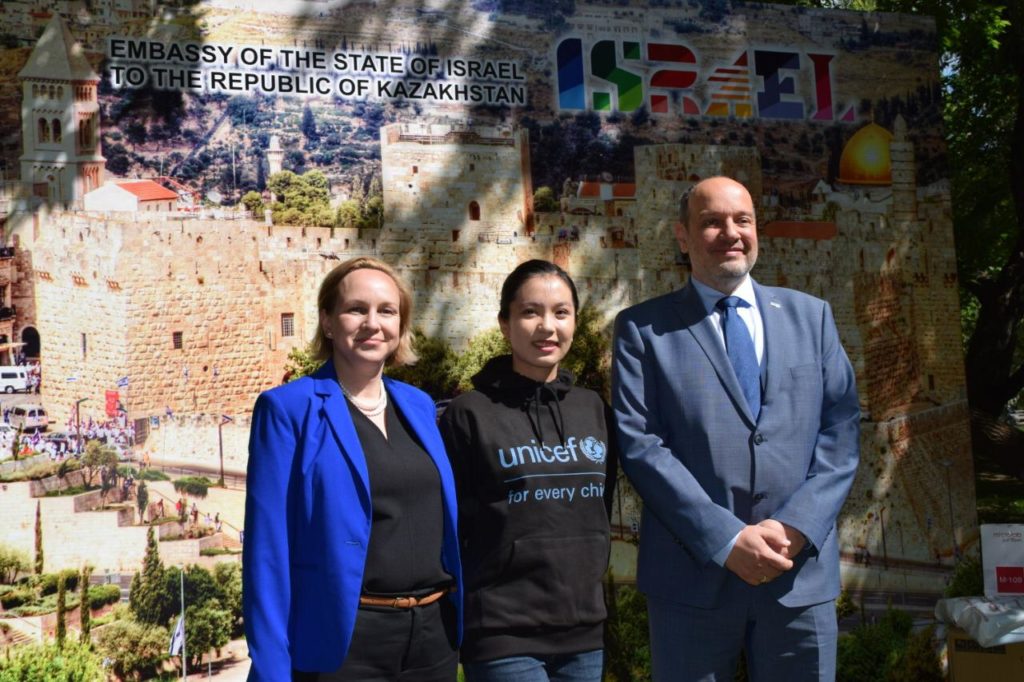NUR-SULTAN – As part of the Year of Youth, the Israeli Embassy in Kazakhstan along with the United Nations Children’s Fund (UNICEF) organised a Day of Empowerment and Capacity Building June 20, with social activities to support and entertain children in contact or conflict with the law who are under the care of the capital’s Chance Centre for Social and Legal Support for Minors.

L-R: Israeli Ambassador in Kazakhstan Liat Wexelman, Kazakh Chess Champion and UNICEF goodwill ambassador Dinara Saduakassova and UNICEF representative in Kazakhstan Arthur van Diesen. Photo credit: Israeli Embassy in Kazakhstan.
The event was held in the capital’s Central Park, where approximately 50 children enjoyed entertainers, played games in groups and danced.
“Such events allow us to take a break from everyday worries and to give strength for new achievements. Outdoor activities always raise your spirit,” said Israeli Ambassador in Kazakhstan Liat Wexelman in her welcoming remarks.
The event’s organisers emphasised all people encounter difficult life situations, but it is important not to give up and seek support from others.
“In every person’s life there are mistakes, ups and downs, and it’s very important that there are people who are ready to support us, give advice and a new chance,” said UNICEF representative in Kazakhstan Arthur van Diesen. “Each of you can make decisions that will change the world and make it better. You are not only our future, you are our present.”
Kazakh Chess Champion and UNICEF goodwill ambassador Dinara Saduakassova shared her thoughts about overcoming difficult situations.
“Probably, you often read about the victories and achievements of our athletes, but I want to say that all of us had difficulties, doubts in life. Most importantly, there were always people who supported me – my mother, relatives, trainers. Sometimes in difficult situations we just need support, a kind word or advice… Each of you has your hobbies, your talents… Believe in yourself; do not be afraid to try. Maybe not everything will work out right away, but thanks to faith in yourself, everything must work out for you,” she said.
The Israeli Embassy in Kazakhstan donated two computers to the Chance Centre.
“Nowadays, quality education is the key to success in the future and appropriate technology is needed for more productive work,” she added.
The centre works with teenagers in difficult life situations, giving them psychological, legal and other types of support.
“In the centre, we teach guitar playing, English and traffic laws and give children an opportunity to work with a psychologist. Psychologists explain the role of laws and family values and discuss the situations the children fell in,” Kymbat Altpayeva, the centre’s psychologist, told The Astana Times.
The centre also holds trainings in educational institutions as preventive measures. Children fall under a bad influence or commit small and medium crimes for a variety of reasons, such as economic difficulties, family conditions and school life.
“Children may have low or high self-esteem or fear (something). In my opinion, mostly these situations appear because parents have no time for children. They don’t organise children’s free time,” she noted.
“It is important to work with the family, school and community to identify the causes. I think that children (need) support and understanding from an adult; to understand, from their perspective, what prompted them to do so. Because as adults, it is easy for us to judge or justify a child, but often we do not know the full view… what is the economic situation in the family, school performance, relationships with peers,” added UNICEF’s children rights protection coordinator Meiramgul Alybekova.
She added the child’s age also plays a role.
“There are many more behavioural features as they are teenagers; behaviour, when they may direct their emotions, aggression in the wrong way. A child has leadership qualities, but he or she cannot implement them, for example, in sports or (at school) and tries to release them where he or she can,” she noted.
Alybekova stressed rather than using a punitive approach, it is vital to develop alternative community-based programmes like the Chance Centre.
“The goal of our work is to reintegrate a child into society, so that there is no stigmatisation of children (in difficult situations). Often, children… in conflict or contact with the law are affected by many factors and why they committed a minor crime. It is important to work with a family, school and community to identify the causes,” she said. “Such an alternative approach is the most effective, because children realise that such behaviour will not lead them to success and to the dreams they strive for.”

